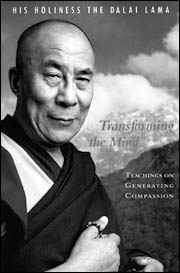


Reviewing
'Transforming the Mind'

"Transforming the Mind"
by XIV Dalai Lama
By John Trainor
Editor's Note: This review is provided by Barnes & Noble bookstore in Oglethorpe Mall. Store employees periodically will write book reviews for The Georgia Guardian's "Book Marks" column.
"Transforming the Mind" is the latest book from the XIV Dalai Lama. It is a follow-up to his 1998 book, "The Art of Happiness." The previous book, written with Howard C. Cutler, M.D., was an investigation into how Western psychology and Tibetan Buddhism deal with and cultivate the state of happiness. The two, in dissimilar vocabularies, merge to form a bridge between the scientific and the spiritual.
In "Transforming the Mind" the Dalai Lama provides a training guide for those wishing to unite these seemingly dissimilar approaches. Although the sequel may be a bit tough to ponder without reading "The Art of Happiness," the reader reaps rewards from persistence. Unlike the volumes of self-improvement books that have appeared on the market, "the Art of Happiness" promotes a routine of inner discipline that focuses on spirituality.
The Dalai Lama claims that in order to solve the emotional problems of our social and economic lives that swirl around us, we must stop to listen to our "inner voices." He promotes intense self-examination via meditation. The goal of the Dalai Lama's technique is to investigate the roots of problems and fixing the ailments, rather than simply dismissing reactions as the symptoms of neurotic behavior. Instead of relieving anxiety through drugs such as Prozac, the Dalai Lama searches for the roots of such symptoms. He proposes that when an individual asks the right questions, he or she will be able to understand the affliction. Once the root of the problem comes to light, he or she will be able curb the natural reactions of his or her body.
While he always keeps a concentrated eye on the spirituality of psychological
problems, the Dalai Lama does not attempt to convert readers. Although he
obviously is a religious leader, he does not alienate the reader because
of a differing theological background. The purpose of the book is not to
promote Buddhism, but to help those afflicted with psychological pain. For
this reason, unlike his other publications, "Transforming the Mind"
is perfect for anyone seeking to bypass pain, regardless of his or her perception
or faith.
Sitemap | Subscribe | Survey | FAQ | Contact Us
Copyright 2000 Georgia Guardian. All rights reserved.